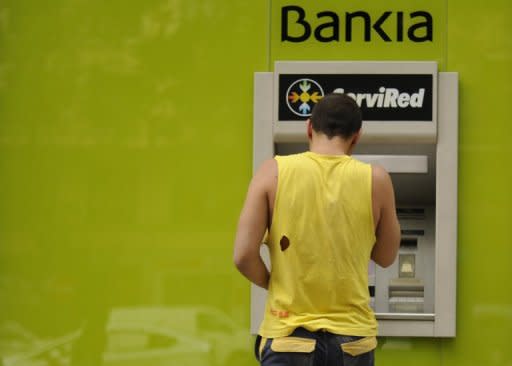Spain names firms to evaluate troubled banks
Spain said Monday it had hired two consultancy firms to audit its banks and dispel deep doubts over their property assets, but it denied any need for a foreign bailout. The appointment of Roland Berger and Oliver Wyman was aimed at erasing dogged concerns over the true value of banks' vast exposure to the property sector, which crashed in 2008. Despite Madrid's reassurances, many investors believe the property-related losses have not been fully recognised and fear that the state may have to take over much of the banks' bad loan portfolio. As a result, Spain's sovereign credit rating has suffered. In a new banking reform, announced May 11, the government required banks to set aside another 30 billion euros ($38 billion) in 2012 in case property assets loans go bad. That was on top of 53.8 billion euros in provisions required under reforms enacted in February. But it also promised to name independent auditors to verify banks' balance sheets, which held 184 billion euros in problematic loans at the end of 2011, 60 percent of the total property portfolio. "The aim of this initiative is to increase transparency and definitively clear up doubts about the valuation of banking assets in Spain," the Bank of Spain said in a statement. The review led by German-based Roland Berger strategy consultants and by Oliver Wyman, which is part of the New York-based Marsh & McLennan consultancy group, would have two parts, the central bank said. The first would be a general valuation of banking balance sheets in Spain and their capacity to resist an adverse scenario, it said. The results were due in the second half of June. The second "fundamental" part of the review would be to contrast how each banking group estimates the value and deterioration of its assets, the Bank of Spain bank said. For this, the consulting firms would hire three auditors by the end of May, charging them with fieldwork on the quality of banking procedures in recognising and making provisions for impaired loans. The results of this work would be revealed "in the next months," the central bank said. Economy Minister Luis de Guindos told reporters at a forum that the country had no need of foreign help for its banks and he was optimistic about the banking sector review. "No external help of any kind is needed," he said. "I am fairly confident that the valuations will not reveal further requirements," the minister added, shortly before the central bank named the two consultancy groups. De Guindos said the government was open to the auditors' conclusions but pointed to the effort already made by Madrid, which he expected to be confirmed by an IMF report due in a few days. Spain's fourth-largest bank, Bankia, which was nationalised this month to salvage its balance sheet, would need about 7.0-7.5 billion euros, the economy minister said. That would mean injecting about another three billion euros in addition to 4.465 billion euros the state put into the bank during the takeover when it converted a loan to its parent group into shares. Spanish banks reported doubtful loans had climbed to 147.968 billion euros in March, equal to an 18-year record 8.37 percent of the total, central bank data showed. Moody's Investors Service last week cut the credit ratings of 16 Spanish banks by one to three notches, citing the effects of recession and the Spanish government's own reduced creditworthiness.



